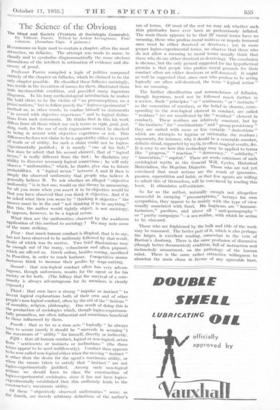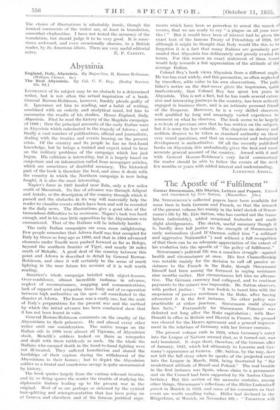The Science of the Obvious
na.Nnnoorcs on logic used to contain a chapter, often the most attractive, on fallacies. The attempt was made to name, to classify and to symbolise diagrammatically the more obvious aberrations of the intellect in estimation of evidence and dis- covery of proof.
Professor Parcto compiled a logic of politics composed entirely of the chapter on fallacies, which he claimed to be the only chapter possible. He classified these fallacies untiringly, was fertile in the invention of names for them, illustrated them With inexhaustible erudition, and provided many ingenious
diagrams. In his long methodological introduction he makes the bold claim to be the victim of " no preconceptions, no a Priori notions," but to follow purely the " logico-experimental " method or, in other words, to confine himself to statements " in accord with objective experience " and to logical deduc- tions from such statements. He thinks that in this his work differs from all those which use such terms as right, good, just, duty, truth, for the use of such expressions cannot be checked RS being in accord with objective experience or not. This
difference he does not claim to be a superiority either in respect of truth or of utility, for such a claim could not be logico- oXperimentally justified ; it is merely " one of his fads." Nor does he admit that his second element, that of " logical
nexus," is really different from the first ; he disclahns any ability to discover necessary logical connexions ; he will only
Observe "uniformities," which, he thinks, give rise to future Probabilities. A " logical nexus " between A and B then is simply the observed uniformity that People who believe A generally:believe B. To ask whether an alleged " objective
uniformity " is in fact one, would on this theory be unmeaning, for all you mean when you assert it to be objective would be that you have observed that you think it objective. And if it be asked what then you mean by " thinking it objective " the answer must be in the end " not thinking it to be anything." Hut this, the author would rightly object, is not sociology. It appears, however, to be a logical nexus.
What then are the uniformities observed by the assiduous application of this method to sociology Y We may note some of the more striking.
First : that much human conduct is illogical, that is to say, ha's not been observed to be uniformly followed by that result,
desire of which was its motive. Two brief illustrations may be enough out of the many, voluminous and often piquant, Which are offered us. Greek sailors, besides rowing, sacrificed to Poseidon, in order to reach harbour. Competitive manu- facturers think to increase their profits by wage-cutting.
Second : that non-logical conduct often has very advan- tageous, though unforeseen, results for the agent or for his
society or for both. (The fallacy that the survival of a com- munity is always advantageous for its members is clearly exposed.)
• Third : that men have a strong " impulse or instinct " to invent logical explanations both of their own and of other
People's non-logical conduct, often by the aid of the " fictions " of morality, religion, philosophy. One result of doing this is the production of sociologies which, though logico-experimen- tally groundless, are often influential and sometimes beneficial to those influenced by them.
Fourth : that so far as a man acts " logically " he always tries to secure (surely it should be " succeeds in securing ")
the maximum of " utility " for himself, directly or indirectly.
Fifth : that all human conduct, logical or non-logical, arises from " sentiments or instincts or inclinations " (the three
terms appall to be used indifferently). Conduct then appears
to be now called non-logical either when the moving " instinct " is other than the desire for the agent's maximum utility, or When the means taken to satisfy that " instinct" are not lOgieo-experimentally justified. Among such non-logical actions we should • have to class the construction of 1°gico-experimental sociologies, since it has riot been logico- exPerimcntally established that this uniformly leads to the constructor's maximum utility.
Of these " objectively observed uniformities " some, as thO fotirth, are merely arbitrary definitions of the author's
use of terms. Of most of the rest we may ask whether such thin platitudes have ever been So pretentiously inflated. The main thesis appears to be that IF moral terms have no meaning, those who profess moral motives 'or impute immoral ones must be either deceived or deceivers ; (or, hi more proper logico-experimental terms, we observe that those who do not allow a meaning to moral terms usually think that those who do are either deceived or deceiving). The conclusion is obvious, but the only ground suggested for the hypothetical premiss is that people who profess moral grounds for their conduct often are either deceivers or self-deceived. It might as well be suggested that, since men who profess to be acting logically are often self-deceived, the term " logical action " has no meaning.
The further classification and nomenclature of fallacies, though ingenious, need not be followed much further in a review. Such " principles " or " sentiments " or " instincts " as the veneration of numbers, or the belief in charms, corre- sponding to the non-logical element in conduct, are called " residues " (or are manifested by the " residual " element in conduct). These residues are relatively constant, but by " the instincts " for " combinations " and " group persistency 7 they are united with more or less variable " derivations " which are attempts to logicise or rationalise the residues : arguments, for instance, why 3 should be a venerable number, definite ritual, supported by myth, to effect magical results, &e. It is easy to see how this technology may be applied to terms like " progress," " reaction," " democracy," " solidarity," " innovation," " capital." There are acute criticisms of such sociological myths as the General Will, Cycles, Historical Materialism, the Hegelian Dialeactic.th le'hroesseulwt of hoareignnoortanyceet, convinced that most actions are
passion, superstition and habit, or tleolatnyfeweead by in
agents are
this to admit this of themselves, will be in book. It stimulates self-criticism.
So far as the author, naturally enough not altogether , successful in escaping " preconceptions," betrays his own sympathies, they appear to be mainly with the type of view usually associated with Sorel. His bugbears are " humani- tarianism," pacifism, and above all " anti-pornography " or " purity campaigns "—a sex-residue, with which he seems to be obsessed.
Those who are frightened by the bulk and title of the work may be reassured. The better part of it, which is also perhaps the larger, is excellent reading, somewhat in the vein of Burton's Anatomy. There is the same profusion of discursive (though better documented) erudition, full Of instruction and melancholy amusement, on the pathology of willingness tomind. There is the same rather attractive ingss to abandon the main chase in favour of any
agreeable hare. The choice of illustrations is admirably ironic, though the
• ironical comments of the writer are, at least in translation, somewhat elephantine. I have not tested the accuracy of the translation, but should judge it to be very good. It is some- times awkward, and even occasionally obscure, to a British reader, by its American idiom. There are very useful editorial notes.E., F. Cannirr.































































 Previous page
Previous page